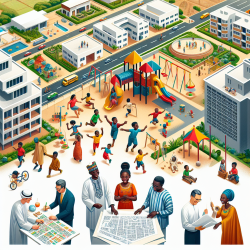Introduction
Play is an essential aspect of childhood development, contributing significantly to emotional, physical, and social well-being. Yet, in urban Ghana, the availability of safe and accessible play spaces is limited, largely due to inadequate policies and rapid urbanization. The research article "Neighbourhood, Built Environment and Children’s Outdoor Play Spaces in Urban Ghana: Review of Policies and Challenges" highlights these issues and suggests actionable steps to improve the situation.
The Importance of Play
International conventions, such as the United Nations Convention on the Rights of the Child, emphasize the importance of play. It is recognized as a right, crucial for children's development. Playgrounds and open spaces not only support physical health but also enhance mental well-being by reducing stress and fostering social interactions.
Challenges in Urban Ghana
Despite the acknowledged benefits, Ghana faces significant challenges in providing adequate play spaces. The study identifies a lack of public policies focused on children's play, compounded by weak city government capacities to protect open spaces. Rapid urbanization further exacerbates these challenges, leading to a decline in physical activity among children.
Key Findings and Recommendations
- Policy Gaps: There is a notable absence of policies specifically targeting children's play and recreation in urban planning.
- Institutional Weakness: City governments struggle with limited resources and political will to enforce land use policies that protect play spaces.
- Informal Play Spaces: Many children resort to playing in informal spaces, which are often unsafe and temporary.
The research recommends a shift in policy to prioritize the creation and maintenance of play spaces. This includes revising existing urban policies to incorporate specific goals for children's recreation and developing a comprehensive play policy akin to those in developed countries.
Actionable Steps for Practitioners
Practitioners can play a pivotal role in advocating for policy changes and implementing community-based initiatives to enhance playability. Here are some steps to consider:
- Advocacy: Engage with policymakers to highlight the importance of play in child development and the need for dedicated play spaces.
- Community Involvement: Collaborate with local communities to identify potential play spaces and develop them into safe, accessible areas for children.
- Research and Development: Conduct further research to gather data on the impact of play spaces on children's health and well-being, using this information to support policy proposals.
Conclusion
Creating playable spaces in urban Ghana is not just about providing physical locations for play; it's about investing in the future of children. By addressing policy gaps and enhancing urban planning strategies, we can foster environments that support the holistic development of children. Practitioners are encouraged to take proactive steps in advocating for and creating these spaces, ensuring that every child has the opportunity to play, learn, and grow.
To read the original research paper, please follow this link: Neighbourhood, Built Environment and Children’s Outdoor Play Spaces in Urban Ghana: Review of Policies and Challenges.










